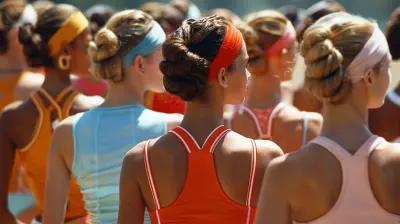The Multisport Coach: Lessons Learned from Coaching Different Disciplines
14 September 2025
Coaching is more than just barking instructions from the sidelines or having a clipboard in hand. It’s about understanding the nuances of performance, motivation, and strategy. Now, imagine doing all that—but across multiple sports. That’s what being a multisport coach is like. It’s a balancing act, a constant game of switching gears, and a masterclass in adaptability.
But what exactly does a multisport coach learn from juggling different disciplines? How do they manage to excel in training athletes for such varied sports? Let’s dive into the lessons learned from the world of multisport coaching and find out what makes these coaches so special.

The Art of Adaptability
One of the first lessons a multisport coach learns is adaptability. Imagine being a soccer coach one day and a swimming coach the next. The skills may seem different on the surface, but at their core, both sports require dedication, discipline, and strategy.So, how does a coach adapt? Simple: they focus on the similarities. Whether it's soccer, basketball, or tennis, athletes need to be mentally tough, physically prepared, and strategically sharp. A multisport coach quickly learns to identify these universal traits and mold their coaching style around them.
But it’s not just about adapting to different sports. A good multisport coach also adapts to different athletes. Every athlete is unique. Some need a push, while others need a pat on the back. Being able to switch up your coaching style to meet the needs of each individual is key. It’s like being a chameleon—always changing colors based on your environment.
Lesson Learned: Flexibility Is Key
In coaching different sports, flexibility becomes second nature. The ability to shift gears between sports, athletes, and training methods is a skill that can only be honed through experience. You learn to be quick on your feet, adapting not just the drills, but how you communicate and motivate your athletes.
Building a Broad Knowledge Base
Coaching across multiple sports requires a deep understanding of various athletic disciplines. Each sport has its own rules, techniques, and nuances. A basketball coach, for instance, must understand the fast-paced, high-intensity world of the court. On the other hand, a tennis coach needs to know the value of precision and endurance.A multisport coach has to be a jack of all trades but also a master of each. This means hours of studying, observing, and learning the intricacies of each sport. They need to know the biomechanics of running for track athletes, the importance of footwork for soccer players, and the mental toughness required in individual sports like tennis.
And it doesn’t stop there. A coach must also stay up to date with the latest training techniques, recovery methods, and sports science. It’s an ongoing learning process, but one that ultimately makes a multisport coach incredibly well-rounded.
Lesson Learned: You Never Stop Learning
The world of sports is always evolving. New techniques, nutrition advice, and recovery methods are constantly emerging. A multisport coach must be a lifelong learner, always seeking to improve their knowledge across various disciplines. It’s not about knowing everything, but about being curious and open to learning from different sports and athletes.
Transferring Skills Between Sports
One of the biggest advantages a multisport coach has is their ability to transfer skills between sports. Many athletic abilities overlap across disciplines. Agility, coordination, endurance, and even mental focus are essential in almost every sport. A coach who has trained athletes in multiple disciplines can see patterns that others might miss.For instance, the footwork required in soccer can help a basketball player improve their defensive stance. The stamina built from swimming can translate into better endurance for a runner. By understanding these connections, a multisport coach can create training programs that maximize an athlete's potential, no matter what sport they play.
Lesson Learned: Cross-Training Is a Hidden Gem
Cross-training is a buzzword in the fitness world, but multisport coaches have been doing it for years. They understand that working on different aspects of fitness—strength, agility, endurance—across multiple sports not only improves performance but also reduces the risk of injury. It’s all about creating a well-rounded athlete who can excel in any situation.
Improving Communication Skills
If there’s one thing a multisport coach has to master, it’s communication. Each sport comes with its own language. The way you explain a strategy in football is completely different from how you’d break down a tennis serve. A multisport coach learns to switch between these languages with ease, making sure their athletes understand exactly what’s expected of them.But communication goes beyond words. It’s also about reading body language, understanding when an athlete is struggling, and knowing when to push and when to pull back. A multisport coach becomes an expert in reading the room—or in this case, reading their athletes.
Moreover, coaching multiple sports often means working with athletes of different ages and skill levels. You might be coaching a group of high school basketball players one day and a youth soccer team the next. Knowing how to adjust your communication based on the athlete's age and experience is key.
Lesson Learned: Effective Communication Is Everything
You can have all the knowledge in the world, but if you can’t communicate it effectively, it’s useless. A multisport coach learns to fine-tune their communication skills, making sure they can explain complex concepts in a way that athletes of all ages and skill levels can understand. It’s about clarity, simplicity, and sometimes, a bit of patience.Developing Patience and Resilience
Speaking of patience, multisport coaches quickly learn that it’s one of their most valuable tools. Coaching different sports means dealing with a wide range of challenges. Athletes may struggle with new techniques, get frustrated with unfamiliar drills, or hit a plateau in their performance. A good coach knows that progress isn’t always linear, and they develop the patience to see their athletes through the tough times.Resilience is another critical trait. Coaching multiple sports comes with its fair share of setbacks. Whether it’s a losing streak in one sport or an injury in another, a multisport coach must be resilient enough to keep moving forward. They understand that success isn’t just about winning; it’s about growth, improvement, and learning from every experience.
Lesson Learned: Patience and Resilience Go Hand in Hand
Patience and resilience are like the yin and yang of multisport coaching. Patience allows a coach to handle the ups and downs of training, while resilience helps them bounce back from challenges. Together, they create a coach who is not only skilled but also mentally tough—a quality they pass on to their athletes.
Creating Well-Rounded Athletes
One of the most rewarding aspects of being a multisport coach is the ability to create well-rounded athletes. When an athlete is exposed to different sports, they develop a diverse set of skills that can enhance their overall athleticism. A soccer player who also runs track will have better stamina. A basketball player who takes up swimming will improve their upper body strength. The benefits are endless.Multisport athletes are also less likely to experience burnout. Focusing on one sport year-round can lead to physical and mental fatigue. By encouraging athletes to try different sports, a multisport coach helps them stay engaged and excited about their training.
Lesson Learned: Variety Is the Spice of Life
Too much of one thing can lead to burnout, both physically and mentally. A multisport coach understands the value of variety. By encouraging athletes to try new sports, they help them develop a broader skill set and keep their passion for sports alive. It’s the ultimate recipe for a long, successful athletic career.Conclusion: The Multisport Coach Advantage
Coaching different sports is no easy task, but for those who take on the challenge, the rewards are immense. A multisport coach learns to be adaptable, builds a broad knowledge base, transfers skills between sports, improves communication, and develops patience and resilience. Most importantly, they help create well-rounded athletes who are prepared to take on any challenge—both on and off the field.Being a multisport coach is like being a Swiss Army knife. You have a tool for every situation, and you know exactly when and how to use it. The lessons learned from coaching different disciplines not only make you a better coach but also a better mentor, leader, and person.
all images in this post were generated using AI tools
Category:
Coach ProfilesAuthor:

Easton Simmons
Discussion
rate this article
1 comments
Merida Carter
Oh, because who wouldn’t want to juggle coaching gymnastics, soccer, and underwater basket weaving all at once? Clearly, the secret to life is mastering every sport under the sun. Next up: coaching synchronized swimming in a kiddie pool. What could possibly go wrong?
September 29, 2025 at 4:53 AM

Easton Simmons
Haha, juggling multiple sports can be chaotic, but each discipline offers unique insights that enrich coaching skills!


